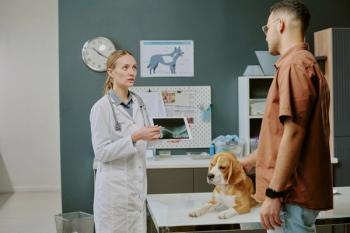
Identifying the cause of acute vomiting in dogs: It matters for treatment and outcome (Sponsored by IDEXX)
With a vomiting dog, it is critical to distinguish between pancreatitis and nonspecific gastroenteritis. This is because the standard-of-care treatment of pancreatitis is no longer identical to treatment of nonspecific gastroenteritis. Accurate diagnosis will guide you to the best treatment plan for your patient.
VOMITING IS COMMONLY observed in dogs. In fact, isolated vomiting episodes that are clinically insignificant are quite common. Most pet owners are aware of this and rarely present their dog to a veterinarian for such an isolated vomiting episode. However, when the dog has several vomiting episodes or there is a noticeable decline in the dog's overall health, veterinary care that involves both diagnosis and treatment is important.
Jörg M. Steiner, MedVet, DrMed.Vet, PhD, DACVIM-SA, DECVIM-CA, AGAF
Diagnosis: Basic and rapid tests make a difference
Many patients with acute-onset vomiting have an acute gastroenteritis for which the exact etiology is rarely ascertained. However, some vomiting patients have acute hepatic disease, acute renal failure, a foreign body, or pancreatitis. Thus, you must make a basic diagnostic effort to differentiate the causes of acute vomiting. Some of the most important steps you can take when evaluating dogs with acute vomiting are to
- Obtain preliminary measurements for basic parameters (i.e. PCV, total solids, blood urea nitrogen [test strip], and blood glucose)
- Collect a baseline blood sample for more comprehensive and specific analysis, including a CBC, a serum chemistry profile with electrolytes, a canine pancreas-specific lipase test (Spec cPL® Test; IDEXX Laboratories), and perhaps other tests depending on the specific patient
- Collect a baseline urine sample for complete urinalysis
- Obtain abdominal radiographs to identify evidence of gastrointestinal obstruction.
If in-house clinical pathology testing is available, run a CBC and a serum chemistry profile immediately. These results will help to rule out renal failure, acute hepatic disease, hypoadrenocorticism, and many other potential causes of acute vomiting. However, it is just as important to exclude pancreatitis as an underlying cause of the clinical signs, and this can be achieved by running an in-clinic canine pancreas-specific lipase test (SNAP® cPL™ Test; IDEXX Laboratories). Many veterinarians believe that this step is not important because the treatment of acute gastroenteritis and pancreatitis is considered to be the same. However, during the past 20 years, the treatment of pancreatitis in dogs has changed dramatically, and the current state-of-the-art treatment of pancreatitis no longer resembles that of nonspecific gastrointestinal upset in dogs (see Table). 1
Contrasting treatment protocols for pancreatitis and nonspecific gastroenteritis in dogs
Deciding between discharge and hospitalization
Assessing the severity of pancreatitis in dogs is also of concern. Many studies have demonstrated that no reliable means for routinely assessing the severity of pancreatitis in dogs is available.2 It is also well-recognized that patients with severe pancreatitis and the risk of life-threatening complications might not display clinical signs commensurate with the severity of their disease, and their condition may deteriorate dramatically over a short period of time. It may be perfectly safe to discharge a patient with acute vomiting due to acute nonspecific gastroenteritis that is not dehydrated and that feels well. On the other hand, a patient with acute vomiting caused by acute pancreatitis should be monitored more closely in the clinic to avoid severe complications and death. It is just as crucial to differentiate a patient with acute vomiting caused by pancreatitis from a patient with acute vomiting as a result of nonspecific gastroenteritis as it is to differentiate a patient with acute vomiting caused by hypoadrenocorticism. Such differentiation can be quickly and easily achieved by the Spec cPL and SNAP cPL tests.
Treatment: Pancreatitis and nonspecific gastroenteritis call for different approaches
The management of canine patients with pancreatitis is very different from that of patients with nonspecific gastroenteritis. As has been demonstrated repeatedly in people with pancreatitis, fluid therapy in pancreatitis patients needs to be aggressive (i.e. the actual fluid requirements must be calculated from the degree of dehydration, maintenance requirements, and ongoing losses).3 This is in contrast to some canine patients with nonspecific gastroenteritis and mild dehydration that can be managed with subcutaneous fluids.
Dogs with nonspecific gastroenteritis should initially be held off food for 24 to 48 hours after the last episode of vomiting, after which first water and then an easily digestible food can be slowly introduced. In sharp contrast, patients with moderate to severe pancreatitis are highly catabolic, and supplying calories to these patients is crucial to the outcome. Patients with pancreatitis should be fed either by the natural route, if they will eat, or through a feeding tube. Partial or total parenteral nutrition may be necessary if feeding through a tube is not an option.4 Also, it is important to feed dogs with pancreatitis an ultra-low-fat food, while patients with nonspecific gastrointestinal upset usually are fed an easily digestible food that contains only slightly less fat than regular food.5
Another difference in the treatment of dogs with acute vomiting caused by pancreatitis or nonspecific gastroenteritis is the routine use of antacids. These drugs can be useful in patients with nonspecific gastroenteritis, but in human patients with pancreatitis, antacids were not associated with a beneficial effect. Furthermore, antacids that effectively increase gastric pH are associated with a dramatic increase in the number of gastric microorganisms in both people and dogs, which may increase the risk of severe aspiration pneumonia when gastric content is aspirated.
Dogs with pancreatitis should be given pain medication whenever possible, while such analgesic therapy is largely unnecessary in patients with nonspecific gastroenteritis.
One important commonality in the treatment of dogs with pancreatitis and those with acute nonspecific gastroenteritis is the use of antiemetic agents, such as a 5-HT3 antagonist (e.g. ondansetron or dolasetron) or a neurokinin (NK1) antagonist (i.e. maropitant). Beyond this, however, the management is different and requires early differentiation of these two conditions.
The take-home message for dogs with acute vomiting
Although vomiting can be a common presenting sign in dogs, when the episodes are frequent or the health status of the dog is compromised, a thorough veterinary evaluation is essential. A basic diagnostic plan should help identify the underlying cause and direct the treatment plan accordingly. The state-of-the-art treatment for pancreatitis has evolved significantly during the past 20 years, and pancreatitis should no longer be treated the same as nonspecific gastroenteritis in dogs.
--------
FREE: 1-HOUR WEBINAR
For 1 hour of CE Credit
The Diagnosis and Management of Canine Pancreatitis
Presented by Jonathan Lidbury, BVMS, MRCVS, DACVIM-SA
Go to
This free 1-hour webinar focuses on the clinically important features of canine pancreatitis.
After watching this webinar, you will
- Understand the variety of presentations of canine pancreatitis
- Be able to diagnose canine pancreatitis
- Know how to manage acute pancreatitis in dogs
- Recognize the importance of differentiating pancreatitis from gastroenteritis in dogs
Dr. Lidbury is with the Gastrointestinal Labatory at Texas A&M University.
--------
Jörg M. Steiner, MedVet, DrMedVet, PhD, DACVIM-SA, DECVIM-CA, AGAF
Dr. Steiner received his PhD for his work on canine digestive lipases and their use for the diagnosis of canine gastrointestinal disorders. He is a professor with the Department of Small Animal Medicine and Surgery and the Department of Veterinary Pathobiology at Texas A&M University. He also serves as director of Texas A&M's Gastrointestinal Laboratory and is involved in a wide variety of research in small-animal gastroenterology.
REFERENCES
1. Steiner JM. Canine pancreatic disease. In: Ettinger SJ, Feldman EC, eds. Textbook of veterinary internal medicine, 7th ed. St. Louis, Mo.: Saunders Elsevier, 2010;1695-1704.
2. Mansfield CS, James FE, Robertson ID. Development of a clinical severity index for dogs with acute pancreatitis. J Am Vet Med Assoc 2008;233(6):936–944.
3. Wu BU, Bakker OJ, Papachristou GI, et al. Blood urea nitrogen in the early assessment of acute pancreatitis: an international validation study. Arch Intern Med 2011;171(7):669–676.
4. Mansfield CS, James FE, Steiner JM, et al. A pilot study to assess tolerability of early enteral nutrition via esophagostomy tube feeding in dogs with severe acute pancreatitis. J Vet Intern Med 2011;25(3):419–425.
5. Steiner JM. Exocrine pancreas. In: Steiner JM, ed. Small animal gastroenterology. Hannover, Germany: Schlütersche, 2008;283–306.
Dr. Steiner has a business relationship with IDEXX pursuant to which he receives compensation from IDEXX from time to time. The views expressed are solely those of Dr. Steiner.
Newsletter
From exam room tips to practice management insights, get trusted veterinary news delivered straight to your inbox—subscribe to dvm360.




